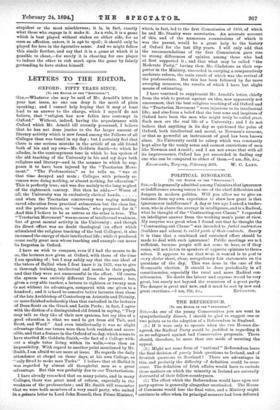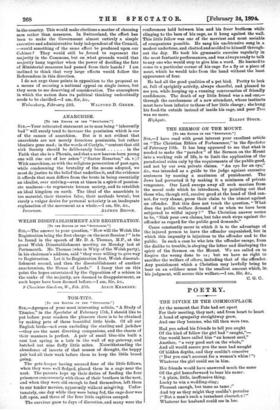THE REFERENDUM.
[To MR EDITOR OF TRI " SPROTILTOR."]
Sin,—As one of the young Conservatives you are wont to sympathetically dissect, I should be glad to suggest one or two points as to the adoption of a Referendum in England.
(1.) If it were only to operate when the two Houses dis- agreed, the Radical Party would be justified in regarding it as no safeguard against bad Conservative proposals. There should, therefore, be more than one mode of securing the appeal. (2.) Might not some form of " national " Referendum leave the final decision of purely Irish questions to Ireland, and of Scottish questions to Scotland P There are advantages in this, and probably the difficulty of definition could be over- come. The definition of Irish affairs would have to exclude those matters on which the minority in Ireland are naturally distrustful of their fellow-countrymen.
(3.) The effect which the Referendum would have upon our party-system is generally altogether overlooked. The House of Commons would lose the final voice, and a Ministry might continue in office when its principal measure had been defeated in the country. This would make elections a matter of choosing men rather than measures. In Switzerland, the effect has been to make the Government almost entirely a simple executive and administrative body independent of the Council, —would something of the same effect be produced upon our Cabinet P They would still be forced to represent the majority in the Commons, but on what grounds would that majority hang together when the power of deciding the fate of Ministerial measures had passed from their hands P I am inclined to think that very large effects would follow the Referendum in this direction.
I do not urge these points in opposition to the proposal as a means of securing a national appeal on single issues, but they seem to me deserving of consideration. The atmosphere in which the nation does its political thinking undoubtedly needs to be clarified.—I am, Sir, &c.,
Wedne8bury, February 12th. WALFOED D. GREEN.



































 Previous page
Previous page